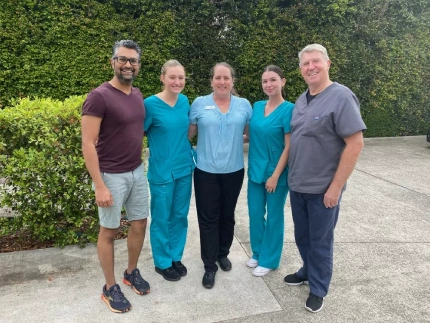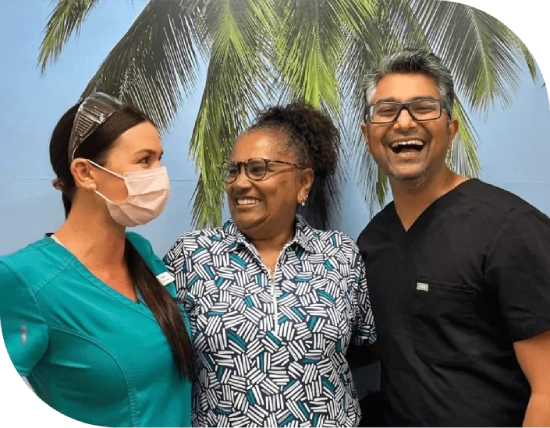
Dentist Mooloolaba
Our practice has been delivering
expert dental services for over two decades.



Discover Family-Centric Dentistry at The Smile Workx
Welcome to The Smile Workx, where we’re committed to delivering gentle, all-encompassing dental care.
Our team is dedicated to ensuring every visit is as relaxing and effective as possible, catering to your individual needs.
Located in the heart of Noosaville at 48 Mary Street, our clinic offers convenient off-street parking and is fully accessible for wheelchair users, providing ease and comfort for all our visitors.
Our services encompass a broad spectrum of dental care, from essential check-ups to intricate cosmetic treatments.
We strive to provide a one-stop solution for all your family’s dental requirements.
Our Special Offers

Check-up & Clean $62.25/week* or $249
⚫ Scale & Clean
⚫ Gum Health Assessment
⚫ Refreshing Fluoride
⚫ New patient hygiene gift
⚫ New patients Only
Health fund rebates available!
⚫ All x-rays included

Kids Specials $0 out of pocket
⚫ GAP FREE for Under 14 years old, health fund members
⚫ Comprehensive Exam and Consultation
⚫ Scale & Clean with X Rays
⚫ Gum Health Assessment
⚫ Refreshing Fluoride

Dental Implants $35/week*
⚫ Complimentary Consultation (Savings of $55)
⚫ Celebratory post treatment gift: Water Air Flosser (valued at $99)
⚫ New Patient Hygiene Gift
⚫ Flexible payment plans

Orthodontics $83/week*
⚫ Complimentary Smile Consultation
⚫ Bonus gift: Custom retainers (valued at $500)
⚫ Celebratory Gift: Professional Whitening Kit (savings of $460)
⚫ New Patient Hygiene Kit

Smile Makeover Package $87.50*/week
⚫ High Quality-Natural Looking Veneers
⚫ Celebratory Post Treatment Gift - Professional Smile Portraits
⚫ New Patient Hygiene Gift

Custom Sports Mouthguards GAP-FREE or $100
⚫ Highly Durable and Comfortable
⚫ Pick your child’s favourite colour!

Check-up & Clean $62.25/week* or $249
⚫ Scale & Clean
⚫ Gum Health Assessment
⚫ Refreshing Fluoride
⚫ New patient hygiene gift
⚫ New patients Only
Health fund rebates available!
⚫ All x-rays included

Kids Specials $0 out of pocket
⚫ GAP FREE for Under 14 years old, health fund members
⚫ Comprehensive Exam and Consultation
⚫ Scale & Clean with X Rays
⚫ Gum Health Assessment
⚫ Refreshing Fluoride

Dental Implants $35/week*
⚫ Complimentary Consultation (Savings of $55)
⚫ Celebratory post treatment gift: Water Air Flosser (valued at $99)
⚫ New Patient Hygiene Gift
⚫ Flexible payment plans

Orthodontics $83/week*
⚫ Complimentary Smile Consultation
⚫ Bonus gift: Custom retainers (valued at $500)
⚫ Celebratory Gift: Professional Whitening Kit (savings of $460)
⚫ New Patient Hygiene Kit

Smile Makeover Package $87.50*/week
⚫ High Quality-Natural Looking Veneers
⚫ Celebratory Post Treatment Gift - Professional Smile Portraits
⚫ New Patient Hygiene Gift

Custom Sports Mouthguards GAP-FREE or $100
⚫ Highly Durable and Comfortable
⚫ Pick your child’s favourite colour!
Why Choose Us?
Choosing our clinic means entrusting your dental health to a team dedicated to excellence and compassion. Our experienced professionals are committed to providing high-quality dental care, ensuring that each patient leaves with a healthier, more radiant smile.
We take pride in our gentle approach and our commitment to your oral well-being. Our practice, a staple in Noosaville, offers a calm, stress-free environment designed to make our patients feel relaxed and cared for. This commitment to comfort and quality has resulted in long-lasting relationships with our patients, many of whom have been with us for years.
We cater to all ages and dental histories, from young children visiting for the first time to seasoned individuals.
Our approach is tailored to meet the diverse needs of our patients, ensuring personalised and thorough dental care for everyone.
Choose The Smile Workx for quality dental care
You can be confident choosing us because we provide compassionate and inclusive dental services.
- Economical and soft approaches to dental care
- Warm, welcoming, and family-centric environment
- Latest technology and innovative practices
- Expert, experienced, and dedicated dental team
- An extensive range of dental services is available
- Multiple payment options for flexibility
- Children's bulk billing facilities
- Approved partners of BUPA, HCF, NIB, and WestFund
- Prompt response for urgent dental needs
- Individualised scheduling for each patient
- Superior options in cosmetic dentistry accessible
For more information on dental treatments and appointments, schedule an appointment with us at (07) 5300 2133.







Payment Plans Available
What Our Customers Say
Frequently Asked Questions
What does the dental implant process involve?
Dental implants have become a cornerstone in modern restorative dentistry, offering a durable solution for missing teeth. This dental treatment involves several stages designed to ensure the longevity and functionality of the implant. Below is a detailed overview of what patients can expect during the dental implant process.
Initial Consultation and Planning
The journey towards receiving a dental implant begins with an initial consultation. During this session, the dentist evaluates the patient’s oral health and the condition of the jawbone and discusses the expected outcomes. This stage is crucial as it determines the feasibility of the implant procedure and tailors the dental treatment plan to the individual’s needs. Advanced imaging techniques like X-rays or CT scans may be employed to assess bone density and pinpoint the exact location for implant placement.
Bone Grafting (If Necessary)
Not every patient is immediately ready for dental implants. If the jawbone lacks sufficient density or volume, a bone graft may be necessary. This part of the process involves taking bone from another part of the body, or using a synthetic bone substitute, to enhance the jawbone. After the graft, patients usually undergo a healing period that can last several months, allowing the new bone to integrate and provide a solid foundation for the implant.
Implant Placement
Once the jawbone is deemed ready, the actual implant placement can proceed. This surgical procedure involves the dentist inserting a titanium post into the jawbone, acting as a synthetic tooth root. Local anaesthesia is used to ensure the patient’s comfort during this procedure. After the implant is placed, there is another period of healing required, allowing the implant to osseointegrate, or fuse, with the jawbone. This integration is what gives the implant its strength and stability.
Abutment and Dental Crown Attachment
Following the integration of the implant with the jawbone, the subsequent stage entails affixing the abutment and linking the dental implant to the replacement tooth or crown. Sometimes, this abutment installation coincides with the initial implantation. Finally, the personalised crown is placed onto the abutment, meticulously crafted to blend seamlessly in shape, size, and shade with neighbouring teeth, ensuring a lifelike appearance.
Aftercare and Follow-up
The success of dental implants extends beyond the surgery room into the patient’s daily oral hygiene routine and follow-up appointments. Proper care involves regular brushing, flossing, and routine dental check-ups. These follow-up visits allow the dentist to monitor the implant, surrounding teeth, and gums to ensure they remain healthy and to address any issues promptly.
How is teeth whitening done?
Teeth whitening, a sought-after cosmetic dental procedure, targets the natural shade of teeth, enhancing brightness without altering the tooth’s surface.
Consultation and Assessment
The teeth whitening process begins with a consultation at your dental practice. The dentist will assess your oral health to ensure that you are a suitable candidate for teeth whitening. This step is crucial to identify any oral health issues that may need to be addressed before proceeding with the whitening treatment.
The Whitening Procedure
If deemed suitable for teeth whitening, the procedure can commence. Typically, the process involves applying a whitening agent to the teeth. This agent usually contains a form of hydrogen peroxide. Before applying the gel, the dentist will apply a protective substance to your gums to shield them from the whitening product.
In-office whitening often involves the use of a special light or laser to activate the whitening agent. This accelerates the bleaching process, allowing for immediate results. The whole session can last from 30 minutes to an hour, during which the solution is meticulously applied and activated.
Aftercare and Results
Post-treatment, your dentist will provide guidance on aftercare to ensure the longevity of the whitening results. This typically includes advice on avoiding certain foods and beverages that can stain teeth, as well as maintaining a rigorous oral hygiene routine.
Regular follow-up visits to the dental practice may be recommended to monitor the whitening results and oral health. The dentist can also provide touch-up treatments if needed, ensuring that your smile remains bright and white.
What is general dentistry?
General dentistry offers a broad spectrum of treatments focused on upholding oral well-being and averting dental problems. It includes routine check-ups, cleaning, fillings, root canals, and the provision of dental bridges and other dental treatments. General dental services are foundational to ensuring long-term oral health and addressing minor problems before they escalate.
What is emergency dentistry?
Emergency dentistry refers to urgent dental care and treatments provided to address immediate issues affecting oral health. This branch of dental practice is crucial for situations that require prompt attention, such as severe toothache, accidents resulting in oral injuries, or sudden complications from tooth decay.
Common Scenarios Requiring Emergency Dental Care
Emergency dental services are typically sought after in cases where there is significant discomfort, risk of infection, or potential long-term damage to oral health. This can include severe pain from tooth decay reaching the nerve of the tooth, leading to abscesses and requiring immediate intervention. Traumatic injuries to the mouth, such as knocked-out teeth, fractured jaws, or cuts to the gums, also necessitate emergency dental care to prevent further damage and start the healing process.
The Role of the Emergency Dentist
A dentist trained in emergency care is equipped to handle various urgent oral health issues. Their primary goal is to alleviate pain, contain the spread of infection, and preserve the natural teeth as much as possible. Immediate treatments may involve administering pain relief, performing root canals, extracting irreparably damaged teeth, or securing loose fillings and crowns.
Importance of Seeking Immediate Help
Delaying treatment in dental emergencies can lead to more severe health complications, including increased risk of infection and greater tooth decay. Therefore, it’s crucial to contact a dental practice as soon as acute dental problems arise. Prompt action not only alleviates pain but also considerably improves the chances of a successful recovery and long-term oral health.
Why is it essential to have routine dental examinations?
Regular dental visits are vital for identifying and managing potential issues like cavities, gum infections, and even oral cancer at an early stage. During these check-ups, our dentists can offer essential preventive measures and guidance, contributing to the preservation of optimal oral cleanliness and general well-being. Furthermore, these appointments provide a chance to develop a trusted relationship with our dentist. Mooloolaba residents can count on our practice for professional, compassionate dental care tailored to their specific needs.
What are the different types of dental implants?
The main varieties of dental implants include endosteal, surgically inserted into the jawbone; subperiosteal, positioned on top of the jawbone under the gum tissue; and zygomatic, the least common, anchored in the cheekbone.
Note: Any surgical or invasive procedure carries risks. Before proceeding, you should seek a second opinion from an appropriately qualified health practitioner.













